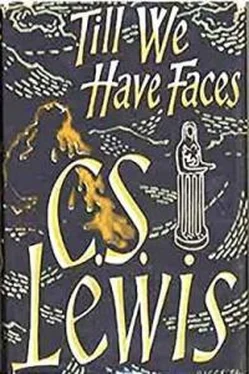“Not that this ever really happened,” the Fox said in haste. “It’s only lies of poets, lies of poets, child. Not in accordance with nature.” But he had said enough to let me see that if the goddess was more beautiful in Greece than in Glome she was equally terrible in each.
It was always like that with the Fox; he was ashamed of loving poetry (“All folly, child”) and I had to work much at my reading and writing and what he called philosophy in order to get a poem out of him. But thus, little by little, he taught me many. Virtue, sought by man with travail and toil was the one he praised most, but I was never deceived by that. The real lilt came into his voice and the real brightness into his eyes when we were off into Take me to the apple–laden land or
_The Moon’s gone down, but
Alone I lie._
He always sang that one very tenderly and as if he pitied me for something. He liked me better than Redival, who hated study and mocked and plagued him and set the other slaves on to play tricks on him.
We worked most often (in summer) on the little grass plot behind the pear trees, and it was there one day that the King found us. We all stood up of course, two children and a slave with our eyes on the ground and our hands crossed on our breasts. The King smacked the Fox heartily on the back and said, “Courage, Fox. There’ll be a prince for you to work on yet, please the gods. And thank them too, Fox, for it can’t often have fallen to the lot of a mere Greekling to rule the grandson of so great a king as my father–in–law that is to be. Not that you’ll know or care more about it than an ass. You’re all pedlars and hucksters down in the Greeklands, eh?”
“Are not all men of one blood, Master?” said the Fox.
“Of one blood?” said the King with a stare and a great bull–laugh. “I’d be sorry to think so.”
Thus in the end it was the King himself and not Batta who first told us that the Stepmother was really at hand. My father had made a great match. He was to have the third daughter of the King of Caphad, who is the biggest king in all our part of the world. (I know now why Caphad wanted an alliance with so poor a kingdom as we are, and I have wondered how my father did not see that his father–in–law must already be a sinking man. The marriage itself was a proof of it.)
It cannot have been many weeks before the marriage took place, but in my memory the preparations seem to have lasted for almost a year. All the brick work round the great gate was painted scarlet, and there were new hangings for the Pillar Room, and a great new royal bed which cost the King far more than he was wise to give. It was made of an eastern wood which was said to have such virtue that four of every five children begotten in such a bed would be male. (“All folly, child,” said the Fox, “these things come about by natural causes.”) And as the day drew nearer there was nothing but driving in of beasts and slaughtering of beasts—the whole courtyard reeked with the skins of them—and baking and brewing. But we children had not much time to wander from room to room and stare and hinder, for the King suddenly took it into his head that Redival and I and twelve other girls, daughters of nobles, were to sing the bridal hymn. And nothing would do him but a Greek hymn, which was a thing no other neighbouring king could have provided. “But, Master——” said the Fox, almost with tears in his eyes. “Teach ’em, Fox, teach ’em,” roared my father. “What’s the use of my spending good food and drink on your Greek belly if I’m not to get a Greek song out of you on my wedding night? What’s that? No one’s asking you to teach them Greek. Of course they won’t understand what they’re singing, but they can make the noises. See to it, or your back’ll be redder than ever your beard was.”
It was a crazy scheme, and the Fox said afterwards that the teaching of that hymn to us barbarians was what greyed the last red hair. “I was a fox,” he said, “now I am a badger.”
When we had made some progress in our task the King brought the Priest of Ungit in to hear us. I had a fear of that Priest which was quite different from my fear of my father. I think that what frightened me (in those early days) was the holiness of the smell that hung about him—a temple–smell of blood (mostly pigeons’ blood, but he had sacrificed men too) and burnt fat and singed hair and wine and stale incense. It is the Ungit smell. Perhaps I was afraid of his clothes too; all the skins they were made of, and the dried bladders, and the great mask shaped like a bird’s head which hung on his chest. It looked as if there were a bird growing out of his body.
He did not understand a word of the hymn, nor the music either, but he asked, “Are the young women to be veiled or unveiled?”
“Need you ask?” said the King with one of his great laughs, jerking his thumb in my direction. “Do you think I want my queen frightened out of her senses? Veils of course. And good thick veils too.” One of the other girls tittered, and I think that was the first time I clearly understood that I am ugly.
This made me more afraid of the Stepmother than ever. I thought she would be crueller to me than to Redival because of my ugliness. It wasn’t only what Batta had said that frightened me; I had heard of stepmothers in plenty of stories. And when the night came and we were all in the pillared porch, nearly dazzled with the torches and trying hard to sing our hymn as the Fox had taught us to—and he kept on frowning and smiling and nodding at us while we sang, and once he held up his hands in horror—pictures of things that had been done to girls in the stories were dancing in my mind. Then came the shouts from outside, and more torches, and next moment they were lifting the bride out of the chariot. She was as thickly veiled as we, and all I could see was that she was very small; it was as if they were lifting a child. That didn’t ease my fears; “the little are the spiteful,” our proverb says. Then (still singing) we got her into the bridal chamber and took off her veil.
I know now that the face I saw was beautiful, but I did not think of that then. All I saw was that she was frightened, more frightened than I; indeed terrified. It made me see my father as he must have looked to her, a moment since, when she had her first sight of him standing to greet her in the porch. His was not a brow, a mouth, a girth, a stance, or a voice to quiet a girl’s fear.
We took off layer after layer of her finery, making her yet smaller, and left the shivering, white body with its staring eyes in the King’s bed, and filed out. We had sung very badly.
I can say very little about my father’s second wife, for she did not live till the end of her first year in Glome. She was with child as soon as anyone could reasonably look for it, and the King was in high spirits and hardly ever ran across the Fox without saying something about the prince who was to be born. He made great sacrifices to Ungit every month after that. How it was between him and the Queen I do not know; except that once, after messengers had come from Caphad, I heard the King say to her, “It begins to look, girl, as if I had driven my sheep to a bad market. I learn now that your father has lost two towns—no, three, though he tries to mince the matter. I would thank him to have told me he was sinking before he persuaded me to embark in the same bottom.” (I was leaning my head on my window–sill to dry my hair after the bath, and they were walking in the garden.) However that might be, it is certain that she was very homesick, and I think our winter was too hard for her southern body. She was soon pale and thin. I learned that I had nothing to fear from her. She was at first more afraid of me; after that, very loving in her timid way, and more like a sister than a stepmother.
Читать дальше











